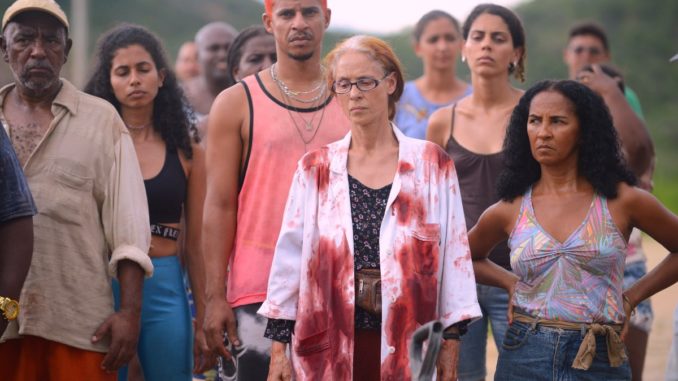
TMN film critic Gordon McPherson gives “Bacurau” five out of five (Symbolic) Joined Hands.
First of all, I hope that you are staying healthy and social distancing amid this COVID-19 pandemic. Hopefully life will go back to normal sometime soon so you can get my autograph before I venture into the great, unemployable unknown.
In the meantime, be thankful that you can still read my movie reviews. As my last batch of reviews for Truman Media Network, I will try to convince you to watch at least one obscure foreign film in the next few weeks. And boy oh boy, have I got a special film to review this week! You can even watch it online, directly supporting an independent cinema along the way.
“Bacurau” — currently available for $12 online courtesy of Ragtag Cinema — centers around a fictional village of the same name located in the Brazillian countryside. Denied ample access to water by corrupt government officials, the residents of Bacurau are forced to make due with limited resources and connections with the outside world. Shortly after the death of Carmelita, the village matriarch played by Lia de Itamaracá, they must band together to fight a bloodthirsty threat. Both their immediate survival and cultural memory is at stake, but this threat underestimates their resilience and ingenuity in the face of seemingly insurmountable obstacles.
What follows is a bloody modern western that remains highly watchable and deeply affecting from start to finish. “Bacurau” held me in a vice-like grip throughout, sending me on an emotional, unpredictable thrill ride not unlike the Oscar-winning “Parasite.” I simply couldn’t take my eyes off the screen.
Directors Kleber Mendonça Filho and Juliano Dornelles have created a revolutionary powder keg of a film, a rallying cry for the oppressed to fight back against the oppressors, all the while remaining a united, loyal community through thick and thin. They refuse to be painted over by an uncaring authority.
Like “Parasite,” “Bacurau” thrives off its unpredictability, both thematically and stylistically. Scenes of stark reality are placed alongside those of cartoonish bravado — reflective of the film’s mixture of sobering allegory and cathartic satisfaction.
These erratic tonal shifts are acceptable because “Bacurau” features endearing characters and filmmaking mastery of the highest regard.
Indeed, the Bacurau residents have formed a vibrant community that immediately garners empathy and sympathy from viewers. Despite others’ efforts to dehumanize and exploit them for personal gain, their spirit cannot be quashed.
Of particular note is Sônia Braga as the courageous, slyly cunning doctor named Domingas, along with Thomas Aquino as the mysterious, hyper-masculine Pacote.
There’s so much I wish I could say about the threat they face, but giving anything away would be a crime. Suffice it to say, when cult actor Udo Kier shows up, craziness ensues.
In terms of style, the film’s western influences are immediately apparent. Slow zooms, camera wipes and cinematic standoffs abound. Elements of science-fiction, horror and B-movie hilarity also rear their heads, breaking rules not unlike Bacurau’s residents.
Rather, Filho and Dornelles massage the best elements of each into a frankly awesome whole unlike anything I’ve seen during my limited time on planet Earth.
Whether or not the film’s eclectic blend of genres works for viewers, the passion poured into this project by everyone involved is impossible to ignore.
Do yourself a favor and watch “Bacurau” as soon as possible. Not only is it my favorite film of 2020 so far, but it will likely remain in my top 5 by year’s end.
Like “Parasite” director Bong Joon-ho himself once said, hurdling the one inch barrier of subtitles will introduce you to amazing films like “Bacurau.” What better time to do that than right now?
Listen to this week’s episode of Dry Ink on this review
